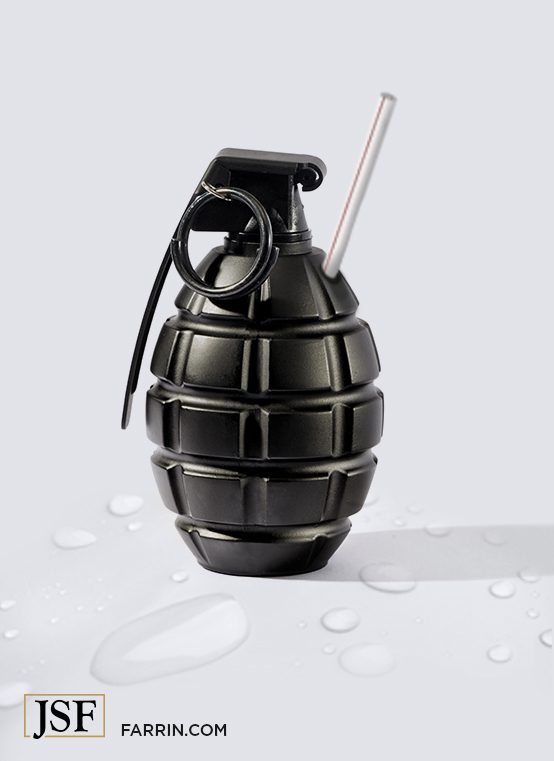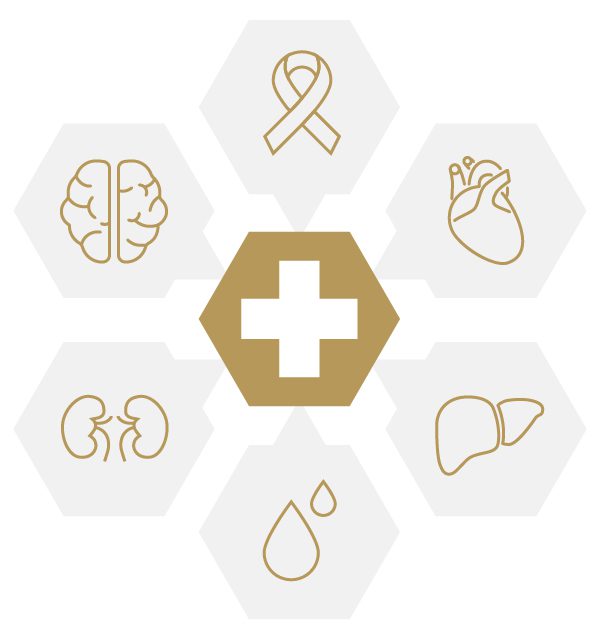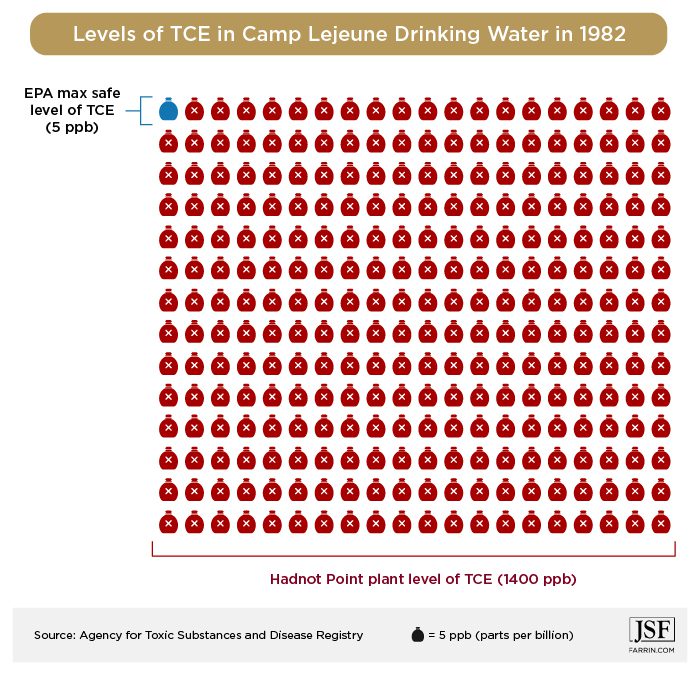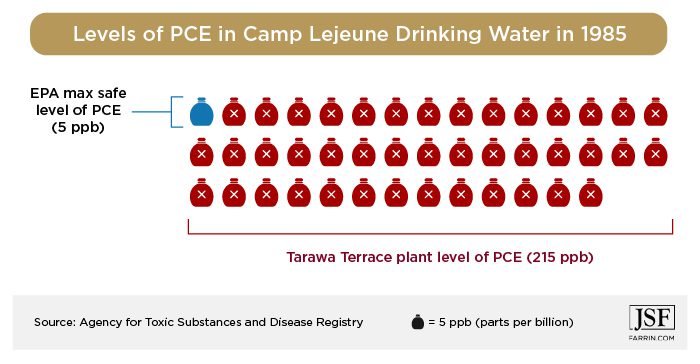Symptoms of Camp Lejeune Water Contamination
The contaminated water of Camp Lejeune may have affected more than a million people over the decades. But how do you know if you’re one of them? The list of possible illnesses and health conditions that could be the result of exposure to contaminated water is staggeringly long and likely incomplete. The Camp Lejeune Justice Act finally enables those harmed to seek relief.
Camp Lejeune Water Contamination Disease Registry
The Agency for Toxic Substances and Disease Registry (ATSDR) assessment of contaminated drinking water at Camp Lejeune found that Marines, Navy personnel, and civilians residing and working at Camp Lejeune were exposed to toxins that increase the risk for developing certain diseases.
The studies concluded that the following diseases were likely associated with Camp Lejeune water.
- Aplastic Anemia
- Bladder Cancer
- Cardiac Defects
- Kidney Cancer
- Kidney Diseases
- Leukemia
- Liver Cancer
- Multiple Myeloma
- Non-Hodgkin’s Lymphoma
- Parkinson’s Disease
- Systemic Sclerosis/Scleroderma
Additional Illnesses Possibly Linked to Camp Lejeune Water Contamination
Additional conditions that are linked to the toxins found in the contaminated water but not mentioned in the study include:
- ALS (Lou Gehrig’s Disease)
- Birth Defects, Low Birth Weight, and Fetal Death
- Brain Cancer
- Brain Damage
- Breast Cancer
- Cervical Cancer
- Colorectal Cancer
- End–stage Renal Disease
- Esophageal Cancer
- Eye Defects
- Fatty Liver Disease (Hepatic steatosis)
- Impaired Immune System Function
- Liver Cirrhosis
- Lung Cancer
- Miscarriage
- Myelodysplastic Syndromes
- Neural Tube Defects
- Neurobehavioral effects
- Neurobehavioral Performance Deficits (i.e. delayed recall and deficits in visual perception), Decreased Blink Reflex, Mood Effects (i.e. confusion, depression, and tension)
- Neurological effects (i.e. delayed reaction times, problems with short-term memory, visual perception, attention and color vision)
- Oral Cleft Defects, including Cleft Lip
- Ovarian Cancer
- Pancreatic Cancer
- Prostate Cancer
- Renal Toxicity
- Severe, Generalized Hypersensitivity Skin Disorder
- Soft Tissue Cancer
Does the Camp Lejeune Justice Act Specify What Symptoms Qualify for Compensation?
The Camp Lejeune Justice Act does not specify symptoms or diseases that qualify and does not limit the people who suffered from the conditions above from seeking compensation. Cancer, for instance, can spread throughout the body. How is one to know that their unlisted cancer was not the result of related undiagnosed cancer elsewhere?
Camp Lejeune water contamination is known to have caused major illnesses, and what we know may only be the beginning. The above disease registry is unofficial and the result of both the ATSDR’s study and reports compiled elsewhere. There is too much history of eligible victims being left behind in lawsuits against the government.
If you or someone you love was stationed at Camp Lejeune between 1953 and 1987 and suffered an illness, contact us immediately.
Camp Lejeune Water Contamination: Health Problems Far and Wide
A million people or more served, lived, or worked at Camp Lejeune during the decades that the water was laced with contaminants. Many of these people are at increased risk for developing the health conditions noted above. Some of these people moved to other military facilities, where there were exposed to other contaminants.
What Specific Toxic Substances Caused My Condition?
Contaminated Camp Lejeune water included both perchloroethylene (PCE) and trichloroethylene (TCE), but it may be impossible to determine exactly which contaminant is responsible for your illness. While some contaminants are directly linked to specific illnesses, the combination of toxic substances, your unique biology, and time makes it hard to say for sure.
The existence of contaminants in the water immediately brings any diseases or conditions linked to them into play, but the list is not the limit.
How Do I Know My Symptoms Are Caused by Camp Lejeune Water Contamination?
Most people go their entire lives without ever developing any of the specific diseases or conditions on this list. And while most people come into contact with toxic substances over the course of their lifetimes, they’re rarely exposed to such high concentrations as were found in Camp Lejeune water.
Even if you have been subjected to other toxic exposures, you may still qualify to file a claim. It is not necessary to prove that your condition was caused only by exposure to contaminated water at Camp Lejeune. The fact that you were stationed there and developed the condition during or after your stay may be enough to support your claim.
Children exposed to the contaminated water could have developed conditions not yet linked to the water supply at Camp Lejeune. While not any health condition will qualify, experienced personal injury lawyers will review medical evidence and medical records to help you determine if you have a case.
What if I Have Received VA Disability Benefits?
The VA is working as designed. If your condition disabled you, the VA should step in. Prior legislation created presumptive conditions – diseases and illnesses that were automatically presumed to result from exposure to Camp Lejeune’s water if a person were stationed at the camp for 30 days or more. Just because you are receiving VA benefits for those conditions does not mean that you do not have a Camp Lejeune claim.
Prior legislative limitations and presumptions do not apply. If Camp Lejeune water contamination caused the condition that disabled you, you still may be entitled to compensation. Contact our firm immediately. Our experienced personal injury lawyers are ready to assist.
What Compensation Might I Be Owed for My Camp Lejeune Water Contamination Symptoms?
Many of the conditions and diseases caused by contaminated Camp Lejeune water require expensive treatments. Chemotherapy, radiation therapy, bone marrow transplants, and many other costly treatments. This is in addition to any lost wages caused by illness or medical treatment.
Even if you don’t have any outstanding medical bills related to your treatment, you may still be entitled to compensation if your emotional trauma and suffering could reasonably have resulted from the water contamination.
If you lost a loved one to Camp Lejeune water contamination, you may be entitled to compensation for loss of society and companionship and lost financial support related to the death of your family member.
If You or Someone You Know Suffered Symptoms of Camp Lejeune Water Contamination, Call Now
The law has set a deadline for claims for compensation, so it is imperative that you act quickly if you’ve suffered due to Camp Lejeune water contamination. Our firm has experience fighting against the government and led a $1.25 billion victory for 15,000+ Black farmers against the USDA.3 We are also currently fighting 3M for veterans suffering from hearing loss in one of the largest Multi-District Litigation cases in U.S. history.
Remember that illnesses and health conditions are not limited to service members – anyone who worked or lived in the facility, including family members, was exposed. Also, remember that diseases need not be limited to those that appear in the registry.
Camp Lejeune water contamination exposed thousands of families to harmful chemicals over more than 30 years. Those Camp Lejeune families deserve justice. Call us at 1-866-900-7078 any time, 24/7, for a free case evaluation and talk to a real person. You can also contact us online or by
chat.





